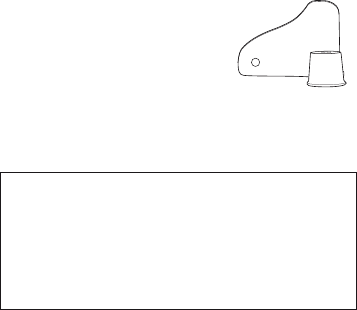
17
Collapsible Kneading Blade
The kneading blade needs
to be in the upright position
to mix ingredients. Lift the
lid and ensure blade has
remained in the upright
position after the ingredients
have been added.
HINT: LIFT THE LID AND CHECK THE
CONSISTENCY DURING THE FIRST 15 MINUTES
OF KNEADING, TO ENSURE IT'S A FIRM, ROUND
DOUGH. IF IT'S A LITTLE DRY, ADD A LITTLE
WATER, IF IT'S A LITTLE WET, ADD A LITTLE
FLOUR.
Order of ingredients
Place liquid in first, the dry ingredients in
next and the yeast in last. Fruits and nuts are
added later, after the machine has completed
the first knead. This will ensure a crisp and
evenly baked loaf every time.
Freshness
Ensure all ingredients are fresh and used
before the specified use-by date.
Avoid using perishable ingredients such as
milk, yoghurt, eggs or cheese, with the Time
Delay function.
Store dry ingredients in airtight containers, to
keep them fresh.
Slicing bread
For best results, wait at least 10 minutes
before slicing, as the bread needs time to
cool. Place loaf on its side and cut in a
sawing motion with a bread knife. For easy
and even slicing we recommend the use of
the Sunbeam Carveasy electric knife.
Freezing bread
To freeze fresh bread, let it cool completely
and wrap in several layers of plastic. Slice
bread before freezing and use at your
convenience.
Toppings
Ingredients such as herbs, sesame seeds and
chopped bacon can be added to the top of
the bread during the baking stage.
Open lid of Bakehouse, gently brush top of
loaf with a little milk or egg yolk and sprinkle
with topping. (Do not allow ingredients to fall
outside pan). Close lid and allow baking to
continue.
Note: This step needs to be done quickly and
gently to prevent bread from sinking.
Crust colour
It is normal for the top of the bread to be
lighter in colour than the sides. Different
combinations of ingredients can encourage or
discourage browning.
Baking at high altitudes
At high altitudes above 900 metres, dough
rises faster. Therefore, when baking at high
altitudes some experimentation is required.
Follow the suggested guidelines. Use one
suggestion at a time and remember to write
down which suggestion works best for you.
Suggestions:
1. Reduce the amount of yeast by 25%.
This will stop the bread from over-rising.
2. Increase the salt by 25%. The bread will
rise slower and have less of a tendency to
sink.
3. Watch your dough as it mixes. Flour stored
at high altitudes tends to be drier. You may
have to add a few tablespoons of water,
until the dough forms a nice ball.
Handy Hints
Upright Position


















